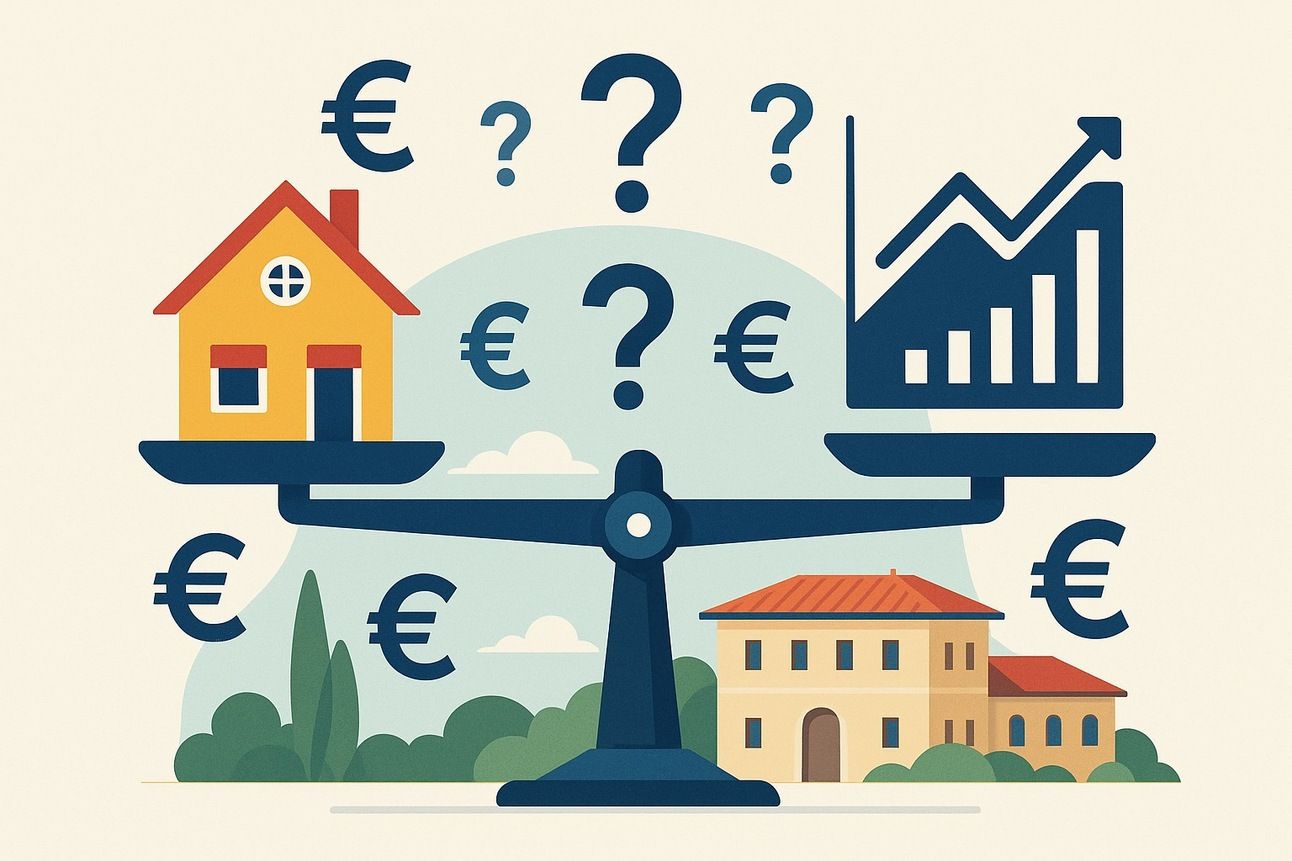- Financial Fluency
- Posts
- Should You Buy or Rent Your Home?
Should You Buy or Rent Your Home?
The decision is not always obvious
Receive Honest News Today
Join over 4 million Americans who start their day with 1440 – your daily digest for unbiased, fact-centric news. From politics to sports, we cover it all by analyzing over 100 sources. Our concise, 5-minute read lands in your inbox each morning at no cost. Experience news without the noise; let 1440 help you make up your own mind. Sign up now and invite your friends and family to be part of the informed.

Welcome to Financial Fluency - your weekly guide to mastering financial English, learning how money works, and making confident financial choices.
In this issue:
A Look at the Markets: Performance June 2025
Should You Buy or Rent Your Home?
Quote of the Day: John Paulson, American hedge fund manager
We value your feedback
Word of the Day: Equity
Test Your Knowledge: Interactive quiz
Whenever you are ready, here is how I can help you

A Look at the Markets: Performance June 2025
Vanguard FTSE All-Word ETF (Accumulating)

Vanguard FTSE All-Word ETF (Accumulating) - justETF.com
The performance of the Vanguard FTSE All-World index was subdued this month because of the strength of the Euro. I will examine this in more detail below.
iShares Core S&P 500 UCITS ETF (Accumulating)

iShares Core S&P 500 UCITS ETF (EUR) - justETF.com
We usually look at the Euro prices of these ETFs. However, because the Euro appreciated over the dollar the price in Euros does not reflect the very strong month that the actual index had when priced in dollars, as shown below:

iShares Core S&P 500 UCITS ETF (USD) - justETF.com
When priced in US dollars the iShares Core S&P 500 ETF shows a very strong 5% return for June 2025.
It should be noted that currency fluctuations sometimes benefit, and sometimes work against investors.
Vanguard EUR Corporate Bond ETF (Accumulating)

Vanguard EUR Corporate Bond ETF (EUR) - justETF.com
An almost flat month for the Vanguard EUR Corporate ETF for June 2025.
Bitcoin Monthly Performance $BTC.X ( ▲ 0.13% )

BTCUSD
A more modest 2.49% gain for Bitcoin in June 2025 as the price hovers around all-time highs.

Should You Buy or Rent Your Home?
The decision is not always obvious

In our previous newsletters, we analysed a €75,000 Italian apartment as an investment property using Warren Buffett's DCF approach. We discovered it was overvalued by 27% as an investment, but leverage could dramatically improve returns. Today, we're switching perspectives entirely.
What if this same apartment wasn't an investment, but your home?
This is a complex decision involving many factors but let's examine the financial aspect today.
The Fundamental Shift
Unlike investment properties where we can discount future cash flows, primary residences generate no rental income to analyse. Instead, we need to compare two strategies:
Buy the property (and all the costs that come with it)
Rent the property (and invest any savings into a global equity index)
Let's run the numbers on our familiar €75,000 Italian apartment from the last few newsletters.
Option 1: Buy with Mortgage
Here's what purchasing finances look like:
Cost Category | Monthly Amount |
|---|---|
Mortgage payment (€60,000 @ 4%, 25 years repayment) | €316 |
Property tax | €33 |
Insurance | €21 |
Maintenance | €42 |
Total Monthly Outflow | €412 |
Initial Investment Required: €15,000 down payment (20%)
Option 2: Rent + Invest
The alternative strategy:
Cost Category | Monthly Amount |
|---|---|
Monthly rent | €500 |
Total Monthly Outflow | €500 |
Initial Investment Alternative: €15,000 invested in S&P 500 (assuming 10% annual return)
Monthly Difference: €500 - €412 = €88 more expensive to rent
The 10-Year Comparison
Let's project both scenarios forward:
Buying Scenario After 10 Years:
Property value: €87,000 (assuming 1.5% annual growth)
Remaining mortgage balance: €42,000
Your total equity: €45,000
Property appreciation: €12,000
Mortgage principal paid down: €18,000
Plus original down payment: €15,000
Renting + Investing Scenario After 10 Years:
Initial €15,000 investment grows to: €38,900
Extra rent paid over 10 years: €10,560 (€88 × 120 months)
Net position: €28,340 (€38,900 - €10,560)
The Verdict
Buying wins by €16,660 over 10 years.
However, it is important to consider other factors. For instance, many people value the security of owning their own home. However, if there is a chance of moving, say, within 5 years, then the flexibility of renting may be a better option.
Your Numbers Will Differ
This analysis uses specific assumptions that may not match your situation:
4% mortgage rate
1.5% annual property appreciation
10% stock market returns
Specific maintenance and tax costs
In next week's newsletter, we will use a different set of numbers and examine a €750,000 property in Rome. The results may surprise you!
As always, none of this is financial advice. Everyone should invest according to their personal circumstances, risk tolerance and financial goals.

Quote of the Day: John Paulson

John Paulson - American Hedge fund manager

We Value Your Feedback!
Your opinion helps us improve and lets you suggest topics or ask Business English questions for future issues.
How did you find this week’s newsletter? |

Word of the Day: Equity
Equity - noun - the difference between a property's current market value and the amount still owed on any loans secured by the property; your actual ownership stake.
"After 10 years of mortgage payments, their equity in the home had grown to €45,000 through both loan repayments and property appreciation."
Context and Usage: Equity represents your true ownership of a property. It increases in two ways: by paying down your mortgage (reducing debt) and through property value appreciation. You can access this equity through refinancing or selling.
Note: Many people confuse equity with property value, but equity is specifically your ownership portion after subtracting any debt (usually a mortgage).
Common Collocations:
Home equity - the ownership stake in your residential property
They used their home equity as collateral for a business loan.
Equity release - accessing the cash value of your property equity
Equity release schemes allow older homeowners to access their property wealth.
Negative equity - when you owe more than the property is worth
The market crash left many homeowners in negative equity.
Equity buildup - the gradual increase in ownership over time
Regular mortgage payments ensure steady equity buildup in the property.
Business Example: The real estate investor calculated her equity across multiple properties to determine her net worth and borrowing capacity.
Property Context: Unlike cash in the bank, property equity is illiquid - you can't easily access it without selling or refinancing, but it represents real wealth that can appreciate over time.

Test your knowledge
If you rent and invest your savings, what kind of investment might offer long-term returns comparable to owning property? |
What does equity mean in the context of home ownership? |

Whenever you are ready, here is how I can help you:
We provide Business English lessons and Cambridge and IELTS preparation courses.
You can book a free 20-minute consultation with Iain over Zoom here:
Why not subscribe to our sister Business Fluency newsletter? It helps English students master essential business terms and provides practical strategies to boost your career prospects.

Disclaimer:
This newsletter is for informational and educational purposes only and should not be construed as financial advice. The information contained herein is generic and does not take into account your individual financial circumstances. You should always consult with a qualified financial professional before making any investment or financial decisions.
Additionally, the authors and/or publishers of this newsletter may hold investments in securities or other financial instruments mentioned herein. These are included for illustrative purposes only and should not be taken as a recommendation to buy or sell such securities or financial instruments.



